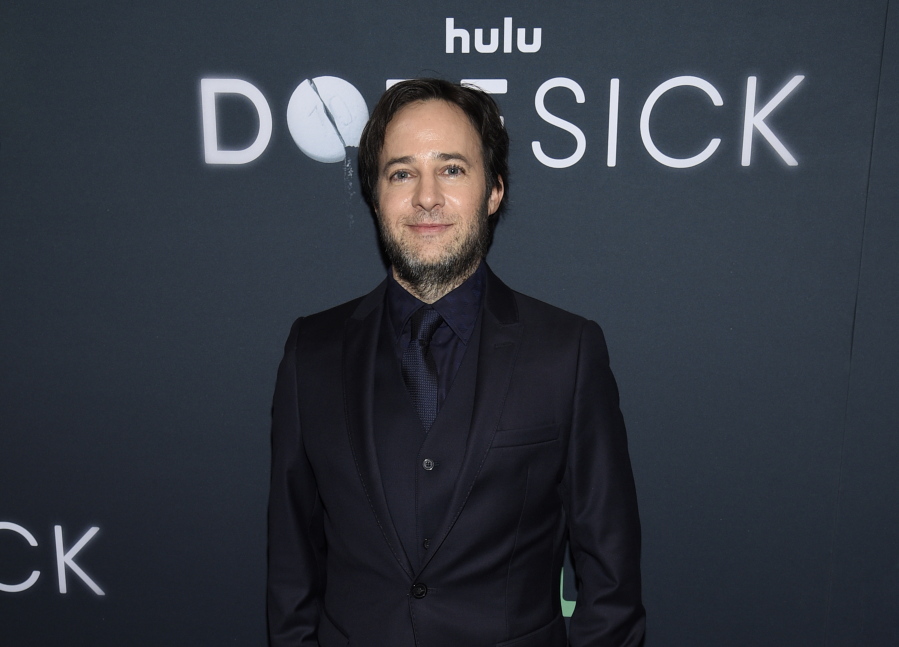LOS ANGELES — Actor Danny Strong pops up regularly in an eclectic batch of series ranging from the lightness of “Buffy the Vampire Slayer” and “Gilmore Girls” to the dark corruption of “Billions.”
But when it comes to investing his time as an Emmy-winning writer and producer, there’s consistency in the projects, whether the subject is politics (“Recount,” “Game Change”) or race (“Lee Daniels’ The Butler”). Strong’s work is topical and trenchant.
Hulu’s “Dopesick” fits the pattern. The eight-part miniseries about America’s opioid crisis weaves together the painkiller’s devastating toll and the actions of those who aided it or failed to stop it. The series debuted earlier this month.
“I want to work on things that feel important, the stories that need to be told,” Strong said. “When done correctly, these kind of stories, the weight of the subject matter and what they’re trying to expose, makes them better pieces of entertainment.”
While some may equate socially relevant projects with being “good for you, or going to school, I don’t view it that way at all,” he said in an interview.
Michael Keaton, playing a family doctor who becomes an unwitting part of the problem, finds a similar sense of fulfillment with “Dopesick” and socially pertinent films in which he’s appeared.
“I’m in a fortunate position where what I do for a living affords me an opportunity to possibly change things or affect people in some way,” he said during a Q&A with TV critics. “If you’re talking about ‘Spotlight” or ‘Worth’ … or other things that I’ve done, I’m fortunate in that regard.”
Strong spent three years researching and writing or co-writing all but one episode of “Dopesick,” which draws in part on journalist Beth Macy’s nonfiction book of the same name. What he learned was eye-opening and maddening.
“It wasn’t until I started diving into the material that I thought, ‘This is just an insane, insane story,’” said Strong, also a director and producer of the series. “I was just so outraged by what they had done at Purdue Pharma.”
The ensemble cast includes Michael Stuhlbarg as Richard Sackler, depicted as a mastermind of the expanded use of Purdue’s OxyContin, and Peter Sarsgaard and Rosario Dawson as federal adversaries of the Sackler family-owned company.
Drug users are a crucial, heartbreaking part of the drama, including a young Virginia mine worker, Betsy (Kaitlyn Dever), who becomes addicted to opioids after being injured. Her parents (Mare Winningham, Ray McKinnon) are frantic to save her.
Some characters, including Richard Sackler, are based on real individuals, while others are fictional or composite figures, which Strong said allowed for a more universal story.
Macy, whose 2018 book’s full title is “Dopesick: Dealers, Doctors, and the Drug Company That Addicted America,” said her work was “all about what happened on the ground, from the perspective of the victims and the people fighting back.”
A dramatization with a comprehensive view of the complex, long-unfolding problem was overdue, said Macy, a series producer.
“It’s hard to capture in one article or even one book,” she said. The series spans “the last 25 years and puts it in an understandable form: This is what happened to our nation, and this is why it’s still part of why we lost 93,000 people last year to overdoses.”
That is the estimated number of U.S. drug overdose deaths in 2020 and an increase of 29 percent from 2019, according to the Centers for Disease Control. Opioid-linked deaths are at a record pace, reaching 70,000 last year. While some opioid deaths over the past two decades have been attributed to OxyContin and other prescription painkillers, most are from illicit forms of opioids such as heroin and illegally made fentanyl.
The series provides context for the spate of headlines about Purdue Pharma’s role and its protracted bankruptcy proceedings, Macy said.
Last month, a federal judge gave conditional approval to a settlement that would remove the billionaire Sackler family from ownership of Purdue and reorganize the business into a charity-oriented company whose profits would go to government-directed efforts to prevent and treat addiction.
A growing number of appeals against the settlement have been filed from states like California, Maryland and Washington, and by some Canadian local governments and entities.
In federal bankruptcy court video testimony given in August, Richard Sackler, a former president of Purdue, repeatedly answered “no” when asked if he, his family or the company caused the nation’s opioid crisis. Other Sackler members have denied wrongdoing, although their company has pleaded guilty twice to federal crimes over their opioid practices.



